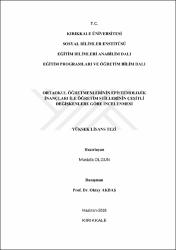| dc.contributor.advisor | Akbaş, Oktay | |
| dc.contributor.author | Olgun, Mustafa | |
| dc.date.accessioned | 2021-01-16T19:01:30Z | |
| dc.date.available | 2021-01-16T19:01:30Z | |
| dc.date.issued | 2018 | |
| dc.identifier.uri | | |
| dc.identifier.uri | https://hdl.handle.net/20.500.12587/15545 | |
| dc.description | YÖK Tez ID: 532205 | en_US |
| dc.description.abstract | Bu araştırma, ortaokul öğretmenlerinin epistemolojik inançları ile öğretim stillerini ve ikisi arasındaki ilişkiyi incelemek amacıyla yapılmıştır. İlişkisel tarama modelinin uygulandığı araştırmada, katılımcıların epistemolojik inanç düzeylerinin belirlenmesinde Schommer (1990) tarafından geliştirilen Deryakulu ve Büyüköztürk (2002, 2005) tarafından Türkçe'ye uyarlanmış "Epistemolojik İnanç Ölçeği", katılımcıların öğretim stillerini belirlemek amacıyla da Grasha (1996) tarafından geliştirilen, Üredi (2006) tarafından Türkçe'ye uyarlanan "Öğretim Stilleri Ölçeği" kullanılmıştır. Araştırmaya katılan öğretmenlere ait demografik bilgileri elde etmek için ise araştırmacı tarafından hazırlanan "Öğretmen Kişisel Bilgi Formu" kullanılmıştır. Ölçme araçları 2016-2017 Eğitim-Öğretim Yılında Kırıkkale ilinde bulunan 41 ortaokulda görev yapan 287 öğretmene uygulanmıştır. Araştırma sonuçları; öğrenmenin çabaya bağlı olduğuna inanç ile uzman stili arasında, öğrenmenin yeteneğe bağlı olduğuna inanç ile kişisel model stili arasında pozitif ilişkiler olduğunu göstermiştir. Ayrıca tek bir doğrunun var olduğuna inanç boyutu ile resmi otorite stili arasında orta düzeyde negatif ve anlamlı bir ilişki saptanmıştır. Öte yandan epistemolojik inançlar ile kolaylaştırıcı stili ve temsilci stili arasında anlamlı ilişki tespit edilmemiştir. Araştırmadan elde edilen bulgular ortaokul öğretmenlerinin epistemolojik inançlarının yaş, branş ve kıdem değişkenlerine göre anlamlı düzeyde farklılaştığını; ancak cinsiyet ve eğitim durumu değişkenleri bakımından anlamlı bir farklılık göstermediğini ortaya koymuştur. Bununla birlikte ortaokul öğretmenlerinin öğretim stillerinin branş ve yaşa bağlı olarak anlamlı düzeyde farklılaştığı; cinsiyet, kıdem ve eğitim durumlarına göre farklılık göstermediği tespit edilmiştir. Katılımcıların öğretim stili kümelerine dağılımı incelendiğinde; ortaokul öğretmenlerinin en fazla temsilci/kolaylaştırıcı/uzman kümesini, en az ise uzman/resmi otorite kümesini benimsediği saptanmıştır. | en_US |
| dc.description.abstract | This research was conducted to investigate secondary school teachers' epistemological beliefs and teaching styles and also the relationship between the two. The epistemological belief scale which developed by Schommer (1990) and then adapted to Turkish by Deryakulu and Büyüköztürk (2002, 2005) was used to determine epistemological beliefs of the participants. For determining teaching styles of the participants, teaching styles scale which developed by Grasha (1996) and then adapted to Turkish by Üredi (2006) was used. Additionally, the teacher personal information form that prepared by the researcher was used to obtain the demographic information about the teachers who participated in the research. The measuring instruments were applied to 287 teachers working in 41 secondary schools in Kırıkkale in 2016-2017 academic year. The research results revealed that there are moderately positive and significant relationships between "the belief of learning depends on effort" and expert style, between "the belief of learning depends on ability" and personel model style. In addition, there is a moderate negative and significant relationship between "the belief that there is only one unchanging truth" and formal authority. On the other hand, no significant relationship between epistemological beliefs and facilitator style, and delegator style was found. Findings from the study showed that the epistemological beliefs of secondary school teachers differed significantly according to age, field of study and seniority variables; but did not show any significant difference in terms of gender and educational status. The research showed that the teaching styles of secondary school teachers differ significantly depending on the field of study and age; but there is no significant difference in terms of gender, seniority and educational status. By examining the distribution of participants' teaching style clusters; it has been determined that "delegator/facilitator/expert" is the most adopted cluster; but "expert/formal authority" is the least. | en_US |
| dc.language.iso | tur | en_US |
| dc.publisher | Kırıkkale Üniversitesi | en_US |
| dc.rights | info:eu-repo/semantics/openAccess | en_US |
| dc.subject | Eğitim ve Öğretim | en_US |
| dc.subject | Education and Training | en_US |
| dc.subject | | en_US |
| dc.subject | | en_US |
| dc.subject | | en_US |
| dc.subject | | en_US |
| dc.subject | | en_US |
| dc.subject | | en_US |
| dc.subject | | en_US |
| dc.subject | | en_US |
| dc.title | Ortaokul öğretmenlerinin epistemolojik inançları ile öğretim stillerinin çeşitli değişkenlere göre incelenmesi | en_US |
| dc.title.alternative | Analysis of secondary school teachers' epistemological beliefs and teaching styles according to various variables | en_US |
| dc.type | masterThesis | en_US |
| dc.contributor.department | KKÜ, Sosyal Bilimler Enstitüsü, Eğitim Bilimleri Anabilim Dalı | en_US |
| dc.identifier.startpage | 1 | en_US |
| dc.identifier.endpage | 134 | en_US |
| dc.relation.publicationcategory | Tez | en_US |
















